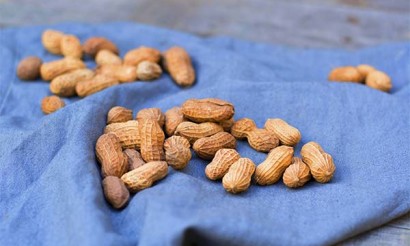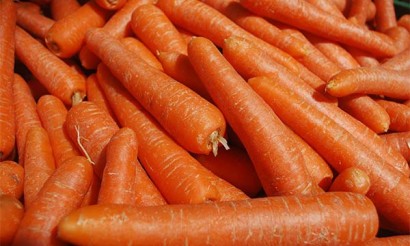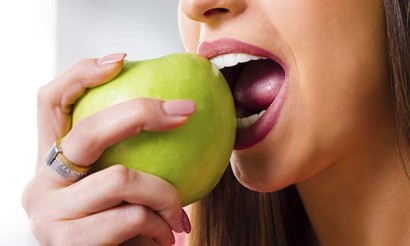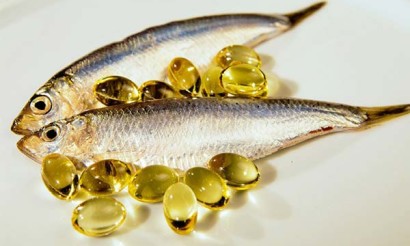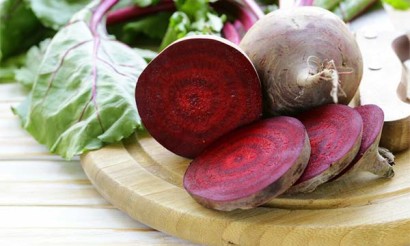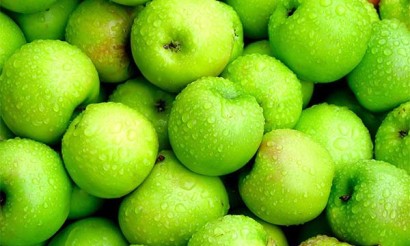Watermelon during breastfeeding: benefits and harms
After the birth of children, the diet of young mothers changes completely. This is due to the fact that the health of the child will depend on their menu. For this reason, she should use in her food products, which are characterized by the presence of a large number of useful minerals and vitamins in their composition. It is also necessary to eat a sufficient amount of fresh vegetables and fruits.
- Composition and calories of watermelon
- How to choose a ripe and sweet watermelon
- How to test watermelon for nitrates at home
- The benefits of watermelon during breastfeeding
- What are the dangers of watermelon during lactation?
- Can I eat watermelon while breastfeeding?
- The first month
- Second month
- Three months
- Four months
- How to eat watermelon when breastfeeding
- How much you can eat per day.
- Can we eat watermelon with bones?
- How to properly introduce watermelon into the diet of a nursing mother
As for the watermelon, it has an impressive composition. Therefore, it is necessary to understand this food in more detail. Experts believe that this berry should necessarily be present in the diet of a new mother, as it concentrates many useful compounds.
When breastfeeding, together with milk, the body of the baby receives a lot of nutrients that ensure proper development. Regarding the use of watermelon in this period, in particular in the first months after birth, it will have to be postponed. This is due to the fact that the fruit is an allergen. To answer the question about the possibility of consuming this berry during breastfeeding, it is necessary to make sure that the baby has no allergies. Only after that, such a vegetable product can be regularly introduced into a woman's menu.
Composition and caloric content of watermelon
Watermelon does not differ in a high degree of nutritional value. In 100 g of such a product contains only 38 kcal, and this is not surprising, since 92% of it consists of water. In addition, it also contains disaccharides, monosaccharides, fructose, sucrose and glucose. This fruit contains important elements for humans, such as iron, magnesium, potassium, and manganese. It also contains vegetable fiber, fatty acids and pectin.
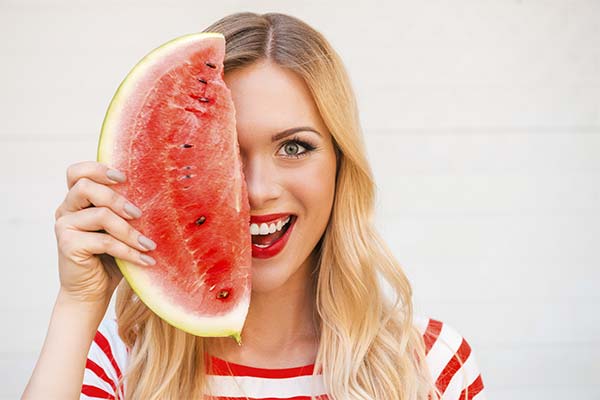
Particular attention should be paid to the vitamin composition of the berry. It contains a full supply of vitamins necessary for normal functioning of the body. It was found retinol, tocopherol, ascorbic acid, vitamin D and most of the representatives of the B-group.
However, it should be taken into account that the percentage of valuable substances depends on the conditions under which the crop was grown. The most useful are berries that have grown in the open soil under natural conditions. No chemical additives were used to grow such fruits.
How to choose a ripe and sweet watermelon
To choose a ripe watermelon, you need to remember that you should be guided by its seasonality. So, it is recommended to buy a sweet berry at the end of summer. Closer to the fall, the fruit ripens naturally without the use of chemicals.
Buy gourds only from proven sellers who can provide documents indicating the quality of available produce.
The size of the berry also plays a role. It should be taken into account that the natural mass for a ripe fruit is considered to be 4-5 kg. It is necessary to know that too large watermelon size indicates that it was grown with the addition of nitrates and various other fertilizers. But at the same time it should be noted that the presence of very small watermelons indicates that they were picked early and most likely not ripe. In addition, such copies do not contain an optimal amount of vitamins and other useful components.
The ripe fruit has a pleasant, sweet smell. If it does not smell anything, it is better to choose another specimen.
You should also remember not to buy products that are burst, cut, sluggish, as well as those that have dents. You should also refrain from buying if the crop is harvested in a pile, is on the ground, and is sold close to the road.
There are several other signs by which you can conclude that the berry is ripe. Its tail should be slightly dried, have a brown color, and if it is severely overdried, it indicates that the products have been stored for a long time. On the side of such a berry there should be a yellow-orange spot. This is proof that the crop has ripened in the conditions necessary for it. The crust of a ripe watermelon is usually firm, colored dark green, with rich dark stripes.
There are usually thin veins in the flesh of the melon crop. If they have yellow coloring, then the product is of low quality. It is better to refuse to buy such watermelon.
How to check watermelon for nitrates at home
Only natural berries grown without fertilizers and other chemicals are considered healthy. It is not possible to check watermelon for nitrates in the store without a special device. However, you can do it at home before you eat the fruit. To do this, you need to completely immerse the watermelon in water. The natural berry usually floats to the surface. If the watermelon was grown using chemical components, it will sink to the bottom.
You can also soak a small piece of watermelon in water for 30 minutes. If the product is natural, the liquid will only cloud slightly. If the water turns bright pink or red, it indicates that the crop is saturated with nitrates.
You can also tell if the watermelon is natural by the cut of the watermelon. If the berry is grown on chemicals, its flesh will have large white or yellowish streaks.
You can also examine the cut of the fruit in bright light. In the presence of large amounts of chemicals, the surface of the crop turns purple.
The benefits of watermelon during breastfeeding
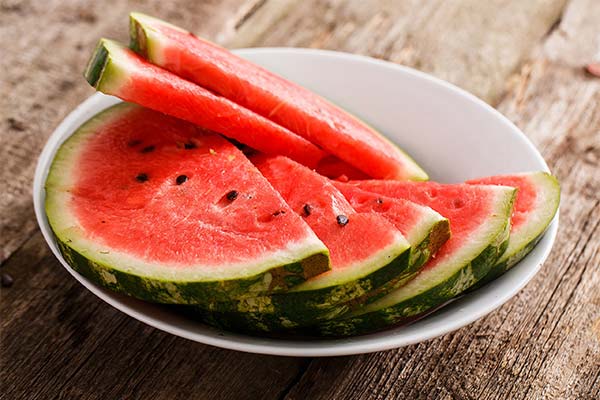
- Watermelon pulp contains a lot of Ca, Mg, Fe. Of vitamins, ascorbic acid, folic acid and other compounds are present here. In combination, all these components accelerate the recovery process after childbirth. Periodic consumption of this product has a positive effect on the overall condition of the child.
- The calcium contained in the crop helps to preserve the beauty of a young mother. In addition, this element provides normal synthesis of breast milk. The growing body of the baby needs quality nutrition. During the first months of lactation, a woman loses calcium, which needs to be replenished in time, otherwise it will have a negative impact on the health of teeth, nails, and hair.
- The high concentration of vitamin C helps to strengthen the body's defenses and increase resistance to various diseases. In addition, the substance helps to cleanse the body of harmful compounds. This is due to the fact that ascorbic acid refers to strong antioxidant substances. Such a composition of watermelon provides support for metabolic processes at the required level. At the same time, you should know that the baby receives vitamin C with milk, which ensures the proper development of connective tissue. Also thanks to this component improves the absorption of iron, strengthens blood vessels.
- As for folic acid, even after the birth of a child, the female body needs this element. It allows the production of the right amount of milk. Also, this vitamin helps to strengthen the baby's bone tissue and improve its mental abilities. A positive effect of this component on the child's nervous system has been noted. This leads to the fact that the child has no problems with sleep. Additionally, the berry helps mommy to prevent the development of anemia. As is known, most women after childbirth face such an ailment.
- The berry is characterized by a high concentration of iron. The consumption of such a product makes up for the lack of this mineral in the body. This element is required for the normal functioning of the immune system, as well as the brain. In addition, this trace element activates the thyroid.
- Another reason why it is recommended to include watermelon in the mother's diet is a sufficient amount of pantothenic acid. This results in a sound and healthy sleep. It also helps to increase hemoglobin levels. The rich composition of the berry protects a young mother's nervous system from stressful situations.
- High quality watermelon saturates a woman's body with all the necessary elements. It increases the resistance of cells to free radicals. Also, regular consumption of this melon crop has a beneficial effect on the condition of the dermis and the overall appearance of the woman.
What are the dangers of watermelon during lactation
If you consider what mineral compounds and vitamins are in this berry, we can conclude that it is a useful product. But along with this, this crop has some negative aspects that can harm both the adult and the child's body. The greatest danger lies precisely in the nitrates, which are contained in the early berries. In such fruits, dangerous substances accumulate the fastest.
As you know, nitrates are a group of substances of nitrogenous origin. They are used to accelerate the process of watermelon ripening. Chemical additives accumulate in the soil in large quantities, so that they penetrate into the flesh of the fruit. As a result, the product becomes potentially dangerous to the human body.
If you eat watermelon, which has a lot of nitrates, after a while the general condition begins to deteriorate. Most often it is manifested in the form of nausea, disorders of the digestive tract, there is increased gas formation. An adult can normally tolerate such a condition. But it will be very difficult for an infant. Children's body reactions can be unpredictable. Therefore, choosing watermelon, you need to be very careful. The berry should be of high quality. When buying, you should ask the seller to present documents confirming the safety of the fruit.
As for the mother herself, you should refuse such a product if you are prone to frequent stomach upsets. It is necessary to take into account that watermelon has a powerful diuretic effect. Therefore, the melon crop is also contraindicated in case of kidney disorders.
Can I eat watermelon while breastfeeding?
Doctors believe that the melon crop is beneficial during lactation for both the mother and her baby. This is due to the fact that such a sweet fruit can saturate the cells with valuable components, vitamins, which ensure normal growth and healthy development of the baby and at the same time improve the activity of the female body. At the same time, some mothers do not experience any side effects after consuming such a product, and some immediately face a number of unpleasant consequences.

Experts assure that this berry should be present in the diet of every breastfeeding girl. As noted above, at this time the female body uses up all the useful components. It is necessary to replenish the reserves of all valuable micro- and macroelements, vitamins and other compounds. Watermelon contains a lot of these substances. You just need to remember that you should not abuse such food. When it is included in the diet of a young mother to carefully monitor the well-being of the baby.
In the first month
During the first month after childbirth, a nursing woman should monitor her diet. She should stick to a special menu, which does not include watermelon. This is due to the fact that the young child's body does not yet have enough enzymes to digest such a difficult food for him.
If you neglect this rule and eat the berry, the baby may experience severe bloating and develop severe poisoning, in some cases, can even lead to hospitalization.
In general, during this period, a woman should give up all berries and red fruits. This also includes apples with this coloring. Otherwise, the newborn baby gets a rash, itching, etc.
It is worth noting that women who are diabetics should refuse the fragrant berry. Also, you should not eat melon crops if you have a disorder of the excretory system. Deteriorate the condition of the new mother can fruit in the detection of kidney stones, pancreatic pathologies. Before including such a product in your diet, be sure to consult a doctor.
In the second month.
If children do not have any health-related disorders, they are not disturbed by colic, then at the end of the second month of their life, a woman can try a small piece of watermelon. Too often such a sweet fruit should not be eaten, but you can enjoy a small slice. If after the consumption of such a product the condition of the baby has not changed, you can continue to include such a product in your diet occasionally. If there were negative phenomena such as rashes, redness, gas, it is better to give up watermelon.
Of course, it is best in the first two or three months of a child's life to follow a strict diet. This is necessary so that he could get used to the new food and his body learned to accept all the valuable substances contained in the milk.
The new food should be introduced gradually. Portions at the same time should be minimal. If after five days no negative signs are revealed, the amount of berry can be increased. However, you should continue to monitor the health of the baby.
At three months.
Closer to three months, the baby's gastrointestinal tract begins to function normally. But still, the introduction of this sweet product into the menu of a nursing girl can still carry a certain degree of danger.
If you really want to eat a slice of watermelon, and a woman is confident in its quality, you can eat a few pieces a week when the baby is three months old. After that, you need to carefully monitor the reaction of the child's body. If side effects appeared, the product falls under a further ban.
Despite the fact that this berry in the HB can bring benefits, in relation to the newborn it can cause unpleasant consequences. Watermelon has a rich composition. But at the same time it refers to the products that can lead to allergic reactions.
If the new mother has even a slight allergy to this crop, she will have to give it up. If the child has developed diathesis, it is necessary to immediately exclude this component from the woman's diet. At the same time, you can not allow this phenomenon to become entrenched in the baby's body, otherwise the ailment will develop into a chronic form.
It is not necessary to give up such a berry forever. After some time, you can try the crop again. It is possible that the allergic reaction was caused only by the fact that the child's digestive and immune systems have not yet been formed enough.
At four months of age
At the age of four months, the baby's digestive tract organs can already withstand various foods consumed by the mother. From this point on, a woman can safely enjoy watermelon.
If before this time, the young mother has not eaten watermelon, the number of slices should be increased gradually. You can start with two slices of flavored culture. In the absence of side effects, the number can be increased to three, etc.
How to eat watermelon while breastfeeding
Eat melon crops should be in moderation, otherwise it can cause a small disorder. Such food should be eaten only after the main meal, and in small portions, because a woman's stomach can be overloaded. This can cause discomfort, heaviness and increased gas. With excessive consumption of watermelon pulp, the baby may also experience discomfort. He may begin to be disturbed by colic. For this reason, enter into the diet of such a berry should be in small portions. Increase the amount of watermelon eaten can be only when it does not disrupt digestion.
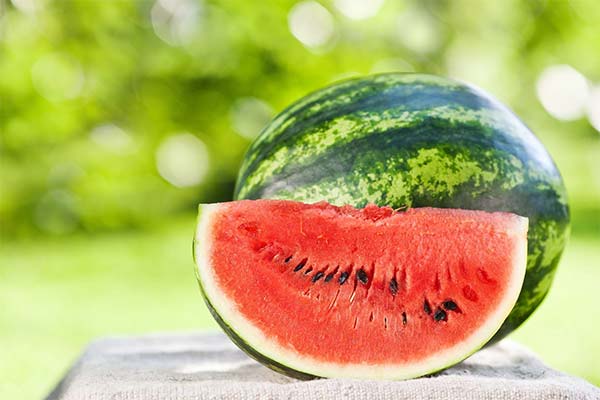
The consumption of a large quantity can be dangerous. Poor quality products are often the cause of severe poisoning, not only in a woman who is breastfeeding, but also in the baby. As noted above, nitrates are used to accelerate the ripening of fruits. All of them remain in the berries, and therefore enter the milk. In addition, the baby's body is more susceptible to such components. So, if the mother's condition is not affected by a small amount of these substances, even the smallest part of them can be dangerous for the baby.
It follows that watermelons during breastfeeding can be eaten, but it should be remembered that such berries can lead to allergies, poisoning and other unpleasant consequences. To protect yourself from such phenomena, it is necessary to choose the fruit correctly. Remember that this product ripens only by the beginning of autumn. It is not recommended to buy melons in the spring and even in the middle of summer. Such watermelons can be poisoned by chemical additives. Also, you should not consume unripe fruits. When buying, look only for intact, undamaged specimens. And you should choose fruits that are in specially designed trays.
How much can be eaten per day
To find out how much of this berry you can eat per day, you need to consider the age of the baby. The older the baby, the more flavorful pulp a young mother can eat. Until three to four months, it is undesirable to use such an ingredient in the menu. After this period, you can eat 2-3 pieces per week. But even then, it is necessary to constantly monitor the reaction of the child's body.
Is it possible to eat watermelon with seeds
Watermelon seeds also have a rich composition. They contain many useful substances, including protein, polyunsaturated fats, vitamins and minerals. The use of these seeds ensures the normal functioning of the digestive system, strengthens the protective functions of the body and restores the health of the hair. In addition, watermelon seeds reduce cholesterol levels and regulate blood pressure. They also help to get rid of chronic fatigue and depression.
But at the same time the seeds can be harmful. They are contraindicated in diseases of the kidneys and urinary system, because this part of the crop contains an amino acid, which when processed synthesizes a small amount of ammonia. With the above-mentioned diseases, this component is especially dangerous. As for pregnant women, as well as those who breastfeed, watermelon seeds should not be eaten.
The greatest benefit of watermelon seeds can be obtained only if you peel them from the outer layer and chew them thoroughly. To make the cleaning of the seeds easier, you can dry them in the oven, heating it to 80 degrees.
Consumption of whole seeds of the melon crop provides intestinal cleansing. However, if you eat them whole along with watermelon, it is much more difficult for the body to get to the valuable protein that is contained inside the seed.
The seeds of this berry act as a prophylactic against worms. So, they can not only purify the body, but also have a positive effect on its recovery. It is also noted the beneficial effect of watermelon seeds on the organs of vision. They are known to have an anti-inflammatory effect.
Even if experts do not advise to eat watermelon seeds in their pure form to breastfeeding women, they can be used otherwise. The useful composition of such seeds can be used in the field of cosmetology.
- Ground grains can be used in the form of a face scrub. Nourishing elements in the composition of such a means will not only help to cleanse the dermis, but also improve its appearance.
- To make the skin become velvety, and the hair restored its beauty, it is advised to use the oil of watermelon seeds.
Whole watermelon seeds can be included in various salads and flour products. Interestingly, in some Eastern countries this ingredient is added to various dishes, being considered a traditional seasoning.
Remember that immature berries with white seeds should not be eaten. Before consuming the flesh of the fruit together with the seeds you need to make sure that they were grown without any artificial fertilizers.
How to introduce watermelon to the diet of a nursing mother
Like any other product, when breastfeeding, watermelon should be introduced into the diet in stages. First you need to eat a small slice of pulp. It is best to do this in the morning. After that, feed the baby and throughout the day to monitor his condition.

If he appeared a small redness, rash, from such a product a nursing woman will have to give up. These phenomena indicate that he has developed an allergy, which can cause diathesis. Also, the baby may have colic or bloating. This is also a reason to refuse the berry. The development of such troubles indicates that the baby's gastrointestinal system is not fully developed and is not able to digest this product normally.
There are cases when after drinking watermelon and breastfeeding the baby's body temperature increases, there is vomiting and pronounced symptoms indicating gastrointestinal distress. In such cases, you should immediately call a doctor or go to the hospital yourself.
If during the day no side effects appeared in the child, the nursing mother can continue to introduce such an ingredient in her menu. You will only need to first check it for the presence of chemicals. It is quite easy to do this. The easiest ways have been described above.
It should be remembered that you should not buy cut watermelons, because the buyer has no assurance that a clean knife was used to cut them. If there are cracks or other damage on the fruit, you should also refuse to buy, because through them harmful bacteria can penetrate the pulp. There should be a ringing sound when tapping the fruit. This indicates that the melon is fully ripe and can be eaten.
If you follow a number of simple rules when consuming watermelon during this period, you can easily minimize the possibility of developing complications.
- Before eating watermelon, it is required to wash it well, you can even use soap for this purpose.
- It is also necessary that the first to eat a piece of watermelon someone from the household. If after a while no unpleasant phenomena appeared, the nursing woman can also eat a piece of fruit.
- It is not recommended to combine the melon culture with bread, drinks, and also to eat it immediately after the main food. Otherwise it will activate increased fermentation in the stomach and lead to increased gas formation.
Well-known doctor E.O. Komarovsky also believes that this berry can be eaten while breastfeeding. However, he advises to buy only quality berries. To do this, you need to check the certificates confirming the quality of the culture every time. You should not be fond of early fruits. This will protect the woman from getting chemicals into her body, preventing poisoning.
Considering all the nuances of choosing a safe product, knowing its valuable characteristics and contraindications, you can consume watermelon even during the pregnancy, but only after the baby is four months old.
Every woman should remember that her diet determines the development and health of her baby. Before you start to eat such a berry, you should check the reaction of the baby to a new product for him and only after that enjoy the sweet fruit, saturating your body with vitamins and various other useful substances.
«Important: All information on this site is provided for informational purposes only. for informational purposes only. Please consult with your health care professional before using any of the recommendations. specialist before using any of the recommendations. Neither the editors nor the authors shall be liable for any possible harm caused by materials."

